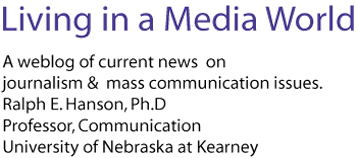
Questions, comments or suggested links? Contact me at:
rhanson40@gmail.com
rhanson40@gmail.com
Mass Communication: Living in a Media World, a new text for Introduction to Mass Communication classes.

 |
Questions, comments or suggested links? Contact me at:
rhanson40@gmail.com Mass Communication: Living in a Media World, a new text for Introduction to Mass Communication classes. |
 |
||
 Support Our Reporters Dept. - Covering Middle East A Thankless Job
Support Our Reporters Dept. - Covering Middle East A Thankless Job Support Our Reporters Dept. - Fox News Journalists Released in Gaza Following Two Weeks in Captivity
Support Our Reporters Dept. - Fox News Journalists Released in Gaza Following Two Weeks in CaptivityQuestions Worth Asking (Maybe)